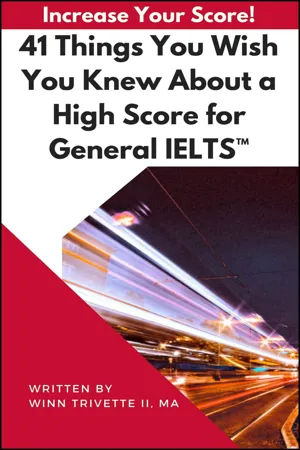
41 Things You Wish You Knew About a High Score for General IELTS™
- English
- ePUB (mobile friendly)
- Available on iOS & Android
41 Things You Wish You Knew About a High Score for General IELTS™
About This Book
Don't fear the General IELTS test!
Now you have these 41 recommendations that will improve both your IELTS and English skills before the test.
Take the exam once and get the score you need!
Use these helpful suggestions from a veteran expert IELTS instructor who gives his own students the same advice.
Use this convenient eText to study for the high score on the exam that you seek – and deserve!
Win the battle against the clock by saving time and avoiding common mistakes on test day with the advice, tips and clear explanations in this IELTS preparation guide.
Plus, sign up for Teacher Winn's General IELTS email blog for more practice to extend your learning so you are better prepared for success on exam day!
Study 41 Things You Wish You Knew About a High Score for General IELTS for latest test-taking strategies to be successful on exam day.
Frequently asked questions
Information
Chapter 1: Assess your level of English fluency.
Chapter 2: Prepare 3 months ahead of the test date
Chapter 3: Personalize your study plan.
Table of contents
- Title Page
- Copyright Page
- 41 Things You Wish You Knew About a High Score for General IELTS™
- Why You Need This Book
- Surprise Gifts for You
- About the Author
- Introduction
- Chapter 1: Assess your level of English fluency.
- Chapter 2: Prepare 3 months ahead of the test date
- Chapter 3: Personalize your study plan.
- Chapter 4: Adopt a positive test-taking attitude.
- Chapter 5: Keep a journal to reach your goal.
- Chapter 6: Learn to manage your time effectively.
- Chapter 7: How to Write the Best Letter Possible
- Chapter 8: Make sure your pronunciation is clear.
- Chapter 9: 7 Common Mistakes
- Chapter 10: Command a strong vocabulary.
- Chapter 11: Know these 6 “hidden skills.”
- Chapter 12: Type speedily.
- Chapter 13: Know the exam format.
- Chapter 14: Reading is fundamental.
- Chapter 15: Prepare your test prep study zone.
- Chapter 16: Sign up for the IELTS Email Blog.
- Chapter 17: Engage in active listening.
- Chapter 18: Help with Lectures: Signal Words
- Chapter 19: Prepare with qualified IELTS teacher.
- Chapter 20: Boost Your Natural English
- Chapter 21: Record your voice for IELTS Speaking.
- Chapter 22: Sidestep these 9 Confusing Word Pairs.
- Chapter 23: How IELTS Scores Your Speaking Tasks
- Chapter 24: How IELTS Scores Your Writing Tasks
- Chapter 25: Use e-flashcards to review your vocabulary.
- Chapter 26: Be fluent with these 9 idioms.
- Chapter 27: Be fluent with these 9 phrasal verbs.
- Chapter 28: Know how to use these 9 collocations.
- Chapter 29: How to Answer the Speaking Questions
- Chapter 30: Write noun clauses and appositives.
- Chapter 31: Write in parallel sentences.
- Chapter 32: Know these essentials of paragraphing.
- Chapter 33: Learn how to read and understand faster.
- Chapter 34: Include these 5C's of writing in WT 2.
- Chapter 35: Use complex grammar structures.
- Chapter 36: Follow the 5 Rules of Vocabulary.
- Chapter 37: Strengthen all 4 language skills.
- Chapter 38: Avoid these 5 common grammar pitfalls.
- Chapter 39: Know how to find the best answers.
- Chapter 40: 3 common writing errors and solutions
- Chapter 41: Precise Proofreading, please!
- 7-Day Online IELTS Score Booster
- Thank You



